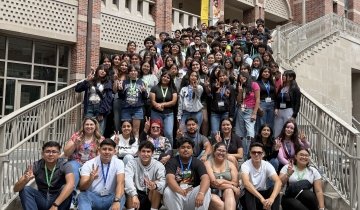The Delphi Project, an initiative of USC Rossier’s Pullias Center for Higher Education, has announced an annual award for institutions that show they are tying faculty models to student success.
The Delphi Award comes with a $15,000 prize, funded by the Teagle Foundation, which is intended to be used by the winning institution to continue, improve and/or scale its work.
The award was created in partnership with the Association of American Colleges & Universities.
Award considerations include how institutions have changed their faculty models to address issues such as professional development, shared governance, equitable compensation and orientation, and how such strategies have been designed around student learning. Emphasis will also be placed on how models treat adjunct and contingent faculty, who often face significant disadvantages in their work compared to tenure-track faculty.
“When I attend conferences, people tell me about the great work they’re doing to improve the policies and practices for non-tenure-track faculty, but this work is not documented in any way,” said Adrianna Kezar, a professor of higher education at USC Rossier and director of the Delphi Project. “Leaders who prioritize supporting faculty should be rewarded and this is a way to do that.”
Kezar noted that adjunct faculty members are usually not paid for office hours, have to split time between institutions and have limited time to prepare for classes and grade assignments. They also have little time to advise or mentor.
“There is 50 years of evidence that faculty-student interactions are related to student learning, persistence and graduation and other forms of success,” Kezar said. “But if faculty have no time to interact with students, as is typically the case for adjuncts, students lose out.”
And often, new adjunct and contingent faculty do not receive any kind of orientation to understand the culture of the colleges and universities hiring them.
“Imagine being hired into such a large and complex organization, but without receiving adequate information about what it looks like to do the job effectively,” said Daniel Scott, a PhD student at USC Rossier and one of the organizers of the Delphi Award.
A panel of experts in higher education will select the award winner, and the award will be presented in November 2018.
As a condition of claiming the prize, award winners will also be expected to share insight into how they built their faculty models.
Even for those colleges and universities that don’t apply for the award, the organizers hope the award’s existence raises visibility around the need to improve faculty supports.
“I think many people are still not aware that there are things universities can—and should—do to better support faculty,” Scott said.
Institutions may be nominated or apply directly; awards will be given to a four-year institution and a two-year institution. Submissions for the award will be accepted until June 1, 2018.



